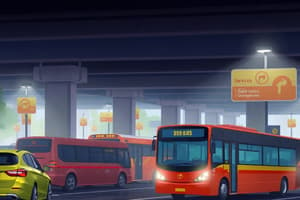Podcast
Questions and Answers
What is the primary advantage of an express bus service compared to a local bus service?
What is the primary advantage of an express bus service compared to a local bus service?
- Lower operational costs
- More frequent stops
- Connections to transport hubs
- Faster transit times (correct)
Which of the following best describes fleet management in bus operations?
Which of the following best describes fleet management in bus operations?
- Planning routes for buses
- Tracking and maintaining buses for reliability (correct)
- Creating timetables for bus service
- Collecting passenger feedback
What is a key component of bus safety and regulation?
What is a key component of bus safety and regulation?
- Driver training programs (correct)
- Limited bus routes
- Increased fare prices
- Shorter waiting times
What strategy helps in optimizing bus service frequency?
What strategy helps in optimizing bus service frequency?
Which of the following is not considered a sustainability practice in bus management?
Which of the following is not considered a sustainability practice in bus management?
What role does data analytics play in bus management?
What role does data analytics play in bus management?
Why are emergency protocols critical in bus operations?
Why are emergency protocols critical in bus operations?
Which technology is most beneficial for real-time monitoring of bus performance?
Which technology is most beneficial for real-time monitoring of bus performance?
What are the primary functions of management?
What are the primary functions of management?
Which type of organizational structure is characterized by a blend of functional and divisional structures?
Which type of organizational structure is characterized by a blend of functional and divisional structures?
SWOT analysis includes which components?
SWOT analysis includes which components?
What is considered an essential role of Human Resource Management?
What is considered an essential role of Human Resource Management?
Which of the following statements about financial management is true?
Which of the following statements about financial management is true?
What does the 'Promotion' element in the marketing mix refer to?
What does the 'Promotion' element in the marketing mix refer to?
Which principle is associated with Lean management?
Which principle is associated with Lean management?
What is the primary focus of change management?
What is the primary focus of change management?
Flashcards are hidden until you start studying
Study Notes
MCQ Anki File: Bus Management
Overview
- Anki is a flashcard software that employs spaced repetition to aid memorization.
- MCQs (Multiple Choice Questions) in Anki help reinforce learning through active recall.
Key Concepts in Bus Management
-
Types of Bus Services
- Local Bus: Serves urban areas; frequent stops.
- Express Bus: Fewer stops for faster transit over longer routes.
- Shuttle Bus: Short, specific routes; often connects transport hubs.
-
Bus Operations
- Scheduling: Timetable creation for optimal service; considers peak and off-peak hours.
- Routing: Planning efficient routes to minimize travel time and fuel consumption.
- Fleet Management: Maintenance and tracking of buses; ensures reliability and safety.
-
Bus Safety and Regulation
- Safety Standards: Compliance with federal and state regulations.
- Driver Training: Regular training programs for safety and customer service.
- Emergency Protocols: Plans for accidents or emergencies during transport.
-
Passenger Management
- Fare Collection: Systems for ticketing; may include cash, cards, or mobile payments.
- Capacity Planning: Understanding passenger volumes to optimize fleet size and service frequency.
- Customer Feedback: Collecting and analyzing feedback to enhance service quality.
-
Sustainability Practices
- Eco-Friendly Buses: Adoption of electric or hybrid buses to reduce emissions.
- Energy Efficiency: Strategies to lower operational costs and environmental impact.
- Public Awareness: Promoting benefits of bus travel to encourage greater ridership.
-
Technology in Bus Management
- GPS Tracking: Real-time tracking of buses for efficient operations.
- Mobile Applications: Tools for passengers to check schedules and routes.
- Data Analytics: Using data to improve services and forecast demand patterns.
Best Practices for MCQs in Anki
- Create questions covering each key concept and subtopic.
- Use clear, concise wording for options to avoid ambiguity.
- Include explanations for correct answers to deepen understanding.
- Regularly review and update questions based on learning progress and new information.
By organizing content into concise, factual study notes, learners can efficiently engage with bus management concepts while using Anki's spaced repetition system for enhanced retention.
Bus Management Overview
- Anki is a flashcard software aiding memorization with spaced repetition.
- MCQs (Multiple Choice Questions) in Anki enforce active recall and learning.
Types of Bus Services
- Local Bus: Serves urban areas with frequent stops.
- Express Bus: Fewer stops for faster transit over longer routes.
- Shuttle Bus: Short, specific routes often connecting transport hubs.
Bus Operations
- Scheduling: Optimal service timetables considering peak and off-peak hours.
- Routing: Planning efficient routes minimizing travel time and fuel consumption.
- Fleet Management: Maintenance and tracking of buses ensuring reliability and safety.
Bus Safety and Regulation
- Compliance with federal and state safety regulations.
- Regular driver training programs for safety and customer service.
- Emergency protocols for accidents and emergencies during transport.
Passenger Management
- Fare Collection: Ticketing systems including cash, cards, or mobile payments.
- Capacity Planning: Optimization of fleet size and service frequency based on passenger volumes.
- Customer Feedback: Collection and analysis of feedback to enhance service quality.
Sustainability Practices
- Eco-Friendly Buses: Adoption of electric or hybrid buses to reduce emissions.
- Energy Efficiency: Strategies to lower operational costs and environmental impact.
- Public Awareness: Promoting bus travel benefits to encourage greater ridership.
Technology in Bus Management
- GPS Tracking: Real-time bus tracking for efficient operations.
- Mobile Applications: Tools for passengers to check schedules and routes.
- Data Analytics: Using data to improve services and forecast demand patterns.
Purpose of MCQs
- Improve knowledge retention via spaced repetition.
- Provide a structured way to test business management knowledge.
- Allow for self-assessment and identification of knowledge gaps.
Key Topics in Business MCQs
Fundamentals of Management
- Defined as the process of planning, organizing, leading, and controlling resources to achieve organizational goals.
- Managers can be classified into three levels; top, middle, and lower-level management.
Organizational Structures
- Different structures impact communication and efficiency.
- Common structures include functional, divisional, matrix, flat, and network structures.
Strategic Management
- Focuses on long-term goals achievement.
- Uses tools like SWOT analysis, which assesses strengths, weaknesses, opportunities, and threats.
Human Resource Management
- HR departments have key roles like recruitment, training, performance evaluation, and ensuring compliance with labor laws.
- Employee motivation and engagement are crucial for organizational success.
Financial Management
- Key activities include budgeting, financial statement analysis (balance sheet, income statement, cash flow statement), and investment analysis.
- Effective cash flow management is essential for business survival.
Marketing Management
- Utilizes the marketing mix (4 Ps): Product, Price, Place, Promotion.
- Market research, segmentation, targeting, and positioning are important for marketing success.
Operational Management
- Focuses on process optimization, lean management, Six Sigma, and supply chain management.
Change Management
- Organizations often change due to external influences (like technological advancements or economic trends) or internal pressures (like organizational restructuring).
- Tools like Kotter's 8-Step Process or Lewin's Change Model can be used for managing transformation.
Project Management
- Project managers guide teams through project phases like initiation, planning, execution, monitoring, and closing.
- Tools used in project management include Gantt charts, PERT diagrams, and project management software.
Business Ethics and Corporate Social Responsibility
- Business ethics defines acceptable behavior within business operations.
- CSR practices can enhance a company's reputation.
- Ethical decision-making frameworks help address business dilemmas.
Tips for Creating Effective MCQs
- Use clear and concise wording.
- Include a mix of factual, application, and analysis questions.
- Ensure answers are unambiguous.
- Leverage real-world scenarios to enhance relevance.
Studying That Suits You
Use AI to generate personalized quizzes and flashcards to suit your learning preferences.




